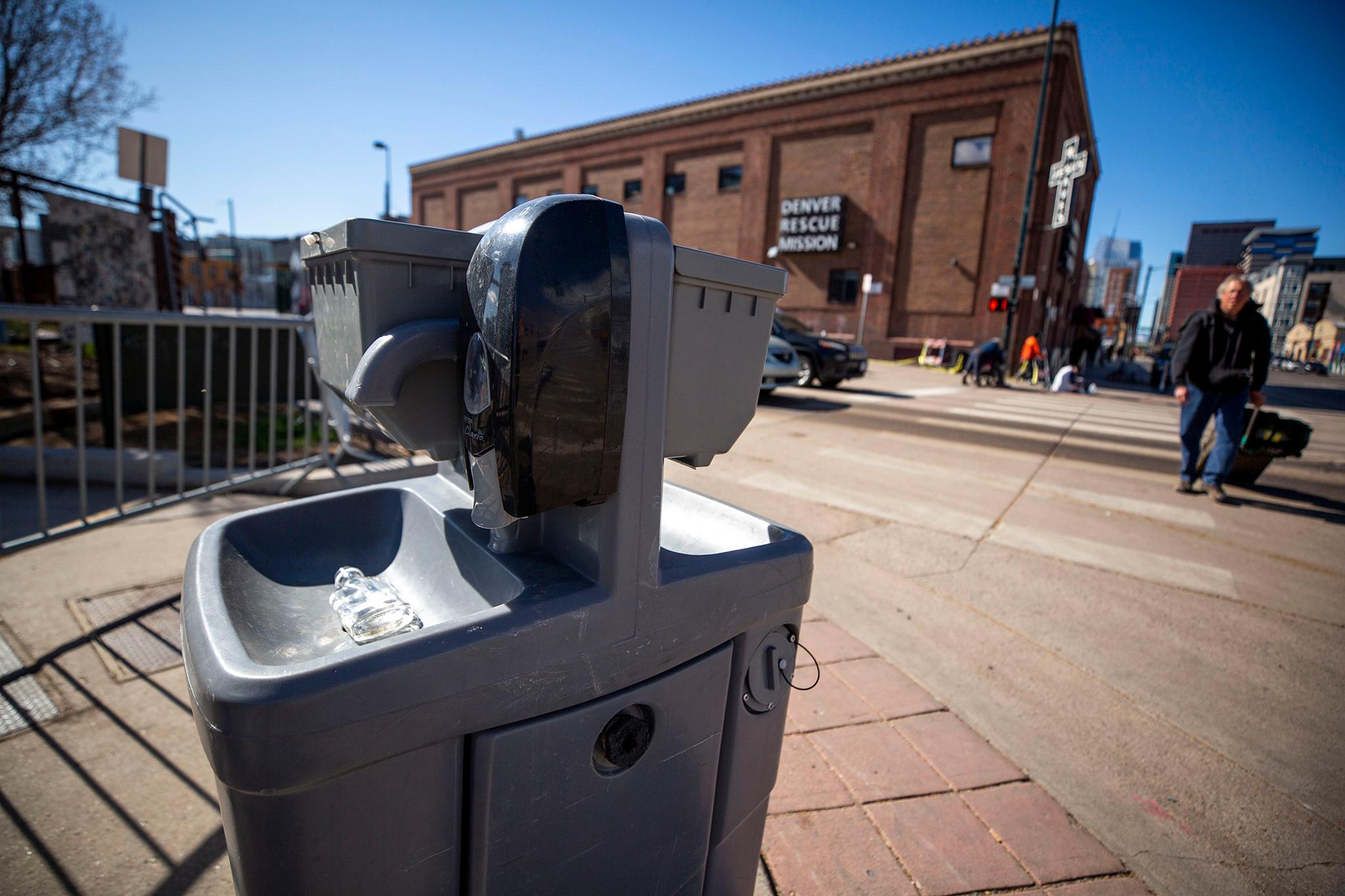The Denver Rescue Mission is closing its existing overnight shelters to move men experiencing homelessness and staff to a new facility open 24 hours a day, seven days a week where they will be able to social distance during the coronavirus outbreak, the president and CEO of the nonprofit said.
Mayor Michael Hancock had made the initial announcement of the new facility, to be erected at the National Western Complex in Denver's Elyria-Swansea neighborhood, without mentioning that it entailed the closure of existing shelters. A later announcement from Hancock's office included what was described as the temporary closure of Denver Rescue Mission's overnight shelters. Brad Meuli, president and CEO of the Denver Rescue Mission, said the move would result in about 300 fewer beds being available, but that his existing shelters have not been full recently.
Eric Escudero, a spokesman for the city, said officials had "worked closely with the Denver Rescue Mission and other providers to plan for adequate sheltering that does not present any shortage of needed beds. We do not foresee a reduction in utilized shelter beds."
If weather or other circumstances make more beds necessary, Meuli said his nonprofit could reopen one of its shelters.
Meuli and other shelter providers had been pressing for a facility where they could provide people experiencing homelessness a place to be around the clock and the space that health experts say is necessary to prevent the spread of COVID-19, the disease caused by the coronavirus. Hancock's office said the new shelter would open Thursday.
A similar shelter for women was planned at the Denver Coliseum, which is near the National Western Complex. It was not clear when that would open.
Stephanie Miller, CEO of The Delores Project, said her organization and others that provide shelter for women experiencing homelessness were working together to determine how to staff a shelter for women that would be open 24 hours a day, seven days a week. Women do not have that option now, she said, which exposes them to higher risk of contracting COVID-19 as they move around the city in search of a place to rest.
"24-7 would allow for shelter in place," Miller said.
Hancock said during a news conference that the goal "is to relieve some of the pressure on our current shelter system."
The National Guard will not be involved in the National Western shelter, despite requests from city and state lawmakers that Gov. Jared Polis order the guard to help with logistics. Britta Fisher, who heads the Hancock administration's housing department and joined the mayor at the news conference, said that as she understood it, the governor was concerned about everyone experiencing homelessness being at one facility. She said that that was not the city's plan and that existing shelters would continue to operate.
Hancock said the governor has to weigh other tasks in which the Guard could be involved.
"They're going to be pulled in a lot of different directions and we recognize that," the mayor said.
While Guard members will not be at the new shelter, 250 are being deployed to help at existing shelters starting Wednesday. In an announcement, the Colorado National Guard said those being deployed to Denver shelters included members from Buckley Air Force Base in Aurora, the Colorado Army National Guard 1st Battalion 157th Infantry from Colorado Springs and the 193rd Military Police Battalion from Denver.
Shelter providers have reported manpower shortages as volunteers have dropped off. In addition, some shelter staff have been asked to stay home because they, like many of the volunteers, are older or are for other reasons seen as at risk of suffering some of the worst effects of COVID-19.
The stress of being on the streets and age, high rates of diabetes and of heart and respiratory illnesses among people experiencing homelessness means they also could be especially hard hit by COVID-19.
Meuli said Guard members would help prepare meals at the Denver Rescue Mission facility on Lawrence Street, which would continue to be open to serve food but no longer as a day shelter.
Instead of members of the Guard, staff from the Denver Rescue Mission will set up the new shelter on the main floor of the National Western Complex Hall of Education. The Denver Rescue Mission, which has room for about 1,000 men at its existing shelters, will also run the National Western facility. Colorado Coalition for the Homeless staff will provide medical care at the new shelter.
Meuli, said 760 beds would be available at National Western.
According to the mayor's office, the National Western shelter "will absorb guest capacity from the Denver Rescue Mission's two current overnight shelters, which will temporary close beginning Thursday, April 9. Additionally, capacity will also be absorbed from the (Salvation Army's) Crossroads Shelter for men, which will remain open, with a target of serving a lower capacity of up to 300 guests with greater capacity."
Meuli, speaking at the news conference with Hancock, said that while the rest of the world has been social distancing, "we have not been able to do that."
Also Tuesday, Hancock announced the city had secured another 151 hotel rooms for people experiencing homelessness who are awaiting coronavirus tests or need a place to stay away from others while recovering from illness. An agreement for the 151 rooms in a downtown hotel must be approved by Denver City Council.
The additional 151 brings the city's total of so-called respite rooms to 270, more than double the number officials had reported a day earlier. Hancock said the city estimates it will need up to 3,000 more.
Service providers have said hotel and motel operators had been reluctant to rent rooms for use by people experiencing homelessness. Monday, Hancock had sent an open letter to the operators, saying the city "desperately needs your help."
Correction: This article was updated to correct that the National Western Complex is in Denver's Elyria-Swansea neighborhood.













